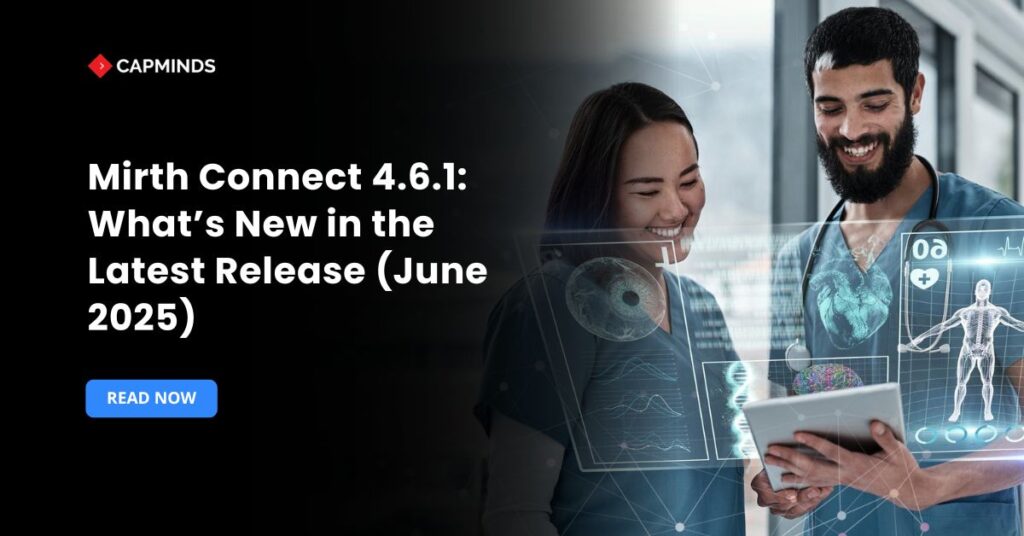Mirth Connect 4.6.1: What’s New in the Latest Release (June 2025)
Mirth Connect integration tools make healthcare data exchange easier, supporting all major messaging standards like HL7 v2, FHIR, X12 EDI, and more. This interface engine helps route, transform, and securely transmit data between disparate systems. It’s a mature, powerful solution for healthcare interoperability, now evolving with new enterprise features and updates in 2025.
What is Mirth Connect?
Mirth Connect is an open-source (now transitioning to commercial) healthcare interface engine that enables fast, easy, and secure exchange of health information between systems.
- First developed in the mid-2000s, it has become a widely used integration engine for hospitals, labs, clinics, and HIEs worldwide.
- Mirth Connect can filter and transform messages across various protocols and formats, acting as the “glue” between EHRs, laboratory systems, radiology PACS, billing systems, public health databases, and more.
- NextGen Healthcare now maintains Mirth Connect, providing commercial support and extensions, while the core engine (up to version 4.5.x) was offered under an open-source license.
Related: Mirth Connect: The Trending HL7 Interface Engine [features & benefits]
What is new with Mirth Connect 4.6.1?
Mirth Connect 4.6.1 (released June 2025) is a patch release focusing on usability, security, and general improvements. Notably, starting with the 4.6 series, NextGen has changed the licensing model, Mirth Connect is now provided under a closed-source enterprise license rather than a dual open-source model. This latest version requires an upgrade to Java 17 as the minimum runtime, ensuring compatibility with modern Java platforms.
It also includes configuration changes (such as a new logging directory property) and enhanced installation options to facilitate upgrades.
Furthermore, Mirth 4.6.1 improves the enterprise-only features launched in 4.6.0, such as new plugins and the Mirth Command Center, while also addressing a number of bugs and security concerns.
This release includes numerous minor upgrades and modifications, as well as enhancements to commercial extensions and products that support the Mirth Connect platform.
What are the new features of Mirth Connect 4.6.1?
1. Enterprise License Model
From version 4.6 onward, Mirth Connect has transitioned to a single enterprise proprietary license model. The source code is no longer public, and users must obtain a license from NextGen to download and use versions 4.6+.
This move enables NextGen to invest in advanced features and provide a more streamlined support experience for all users under a commercial agreement.
2. Java 17 Support (Updated Requirements)
Mirth Connect 4.6.1 requires Java 17 as its minimum version. Previous releases supported Java 8 (with incomplete compatibility up to Java 11/16), but the platform has now been updated to Java 17 (LTS) to take advantage of recent Java features and security.
This improves performance and provides long-term support, however, users must upgrade their Java runtime when upgrading to 4.6.1. Furthermore, the minimum supported MySQL database version has been increased to MySQL 8.0 (up from 5.7 in previous versions), following current technical standards.
3. Enhanced Logging Configuration
There is a new property.logs configuration setting for log file paths in the log4j2.properties file. This replaces the old dir.logs property (now deprecated). Administrators can set an absolute or relative log directory via the property.logs, and the log file names/patterns use this variable.
When upgrading, the installer will automatically carry over your chosen log directory to the new setting. This change simplifies log management. If no custom log settings were made, no action is needed, but if you had custom file paths, you should update them to use ${logs}/… format.
4. Improved Installation Process
Mirth 4.6.1 brings better support for command-line and headless installations. The same expanded choices seen in the GUI installer are now available in console-mode installations.
This makes it easier to script installations and deploy Mirth in environments without a graphical interface, resulting in a more seamless upgrade/installation experience for DevOps and cloud deployments.
5. New Enterprise Extensions
The 4.6 series introduces a suite of Enterprise plugins that greatly extend Mirth’s capabilities. These include
- An SSL Manager (for centralized certificate and TLS configuration management)
- Channel History (which tracks changes to channels for auditing and versioning)
- An HL7 Message Generator (which can easily generate HL7 v2.x messages for testing and simulation).
These improvements improve the user experience and offer more sophisticated integration tools to enterprise users. For example, the HL7 Message Generator plugin makes it simple to generate sample HL7 messages for test cases, making interface creation and testing easier.
6. Mirth Command Center
All licensed tiers now include access to the Mirth Command Center, a new web-based monitoring and analytics portal.
The Command Center provides a unified dashboard of your Mirth Connect deployments, aggregating environment and performance metrics across multiple instances and channels.
- With MCC, administrators can track channel throughput, error rates, system health, and even perform certain management tasks centrally.
- It also offers channel analytics, for example, measuring message volumes per channel, to help optimize and troubleshoot interfaces.
- This tool, introduced with version 4.6, underscores NextGen’s focus on enterprise-level monitoring and easier management of Mirth Connect clusters.
7. Docker Image Distribution
(For users who deploy with Docker) Starting with 4.6, official Docker images of Mirth Connect are no longer published on Docker Hub for public download. Instead, Docker images are provided via the Mirth Command Center for licensed users. All previous version images up to 4.5.x remain on Docker Hub, but for 4.6+, you will retrieve images from NextGen’s private repository through MCC.
Related: Top 5 HL7 Integration Challenges and Solutions for 2025
What are the fixed defects of Mirth Connect 4.6.1?
Hostname Verification for Connectors: Mirth 4.6.1 fixes an issue with SSL/TLS hostname verification. In prior versions, certain connectors did not properly verify hostnames in certificates. Now, connectors correctly validate SSL certificate hostnames, preventing potential man-in-the-middle risks and ensuring secure connections to remote endpoints.
File Reader SFTP Loop Fix: A bug that could cause the File Reader connector (in SFTP mode) to enter an infinite loop has been resolved. Previously, under certain error conditions, an SFTP reader channel might continuously retry and never exit. In 4.6.1, this no longer occurs – the SFTP file reader will handle errors gracefully and not hang in a loop.
Attachment Viewer Display: The Message Attachment Viewer in the Mirth Connect Administrator had an issue where attachments that were not Base64-encoded would not display. This has been fixed. Users can now view non-base64 attachments (for example, text or XML attachments) directly in the administrator interface without issues.
HTTP Sender Connection Requirements: The HTTP Sender connector’s connection handling has been adjusted for reliability. Some connection settings and timeout requirements that caused issues in previous versions have been updated. This means sending messages via HTTP(S) is more robust in 4.6.1, especially under high loads or with unstable network conditions.
What are the security improvements in Mirth Connect 4.6.1?
1. Updated Libraries
The platform continues to update third-party libraries to eliminate known vulnerabilities. Notably, the Bouncy Castle cryptography library was updated from version 1.71 to 1.78.1, addressing several security issues in cryptographic functions.
The SMB/CIFS library jcifs-ng was updated to v2.1.10, and the JSch SSH library to v0.2.18, these updates fix various bugs and security flaws. The MySQL JDBC Driver was also bumped to 8.2.0 for compatibility with MySQL 8 and to resolve any driver vulnerabilities.
2. Vulnerability Patches
This release includes patches for critical security vulnerabilities that came to light in 2023. In particular, the unauthenticated RCE flaws identified as CVE-2023-37679 and CVE-2023-43208 have been fully mitigated by updates in the 4.4.1+ releases.
Mirth Connect 4.6.1, being a later version, incorporates these fixes, safeguarding the system against those remote code execution exploits. Healthcare organizations are advised to run 4.4.1 or later to ensure protection against these and other known vulnerabilities.
3. Secure Licensing & Updates
With the move to an enterprise model, NextGen has enhanced the software delivery pipeline to ensure authenticity and security. The Mirth Connect Administrator Launcher tool was updated alongside 4.6.1 to meet new code-signing requirements, so clients can trust that the admin app is verified and untampered.
Moreover, the new licensing system means downloads are obtained through secure channels, reducing the risk of downloading compromised binaries.
What are the commercial extension improvements?
1. SSL Manager – Additional Allowed Hosts
The SSL Manager extension received an update in 4.6.1 to support “Additional Allowed Hosts.”
- This feature lets you specify alternate hostnames for a certificate, improving flexibility when configuring HTTPS connectors or web service listeners behind proxies.
- Essentially, it streamlines SSL configuration for cases like alias hostnames or internal vs external URLs by allowing multiple hostname entries to be associated with a certificate.
2. HL7 Message Generator
The new Message Generator plugin in the Enterprise suite greatly aids testing and development. It allows users to quickly generate HL7 v2.x message instances with custom values.
This is useful for simulating inbound messages or populating channels with test data. In 4.6.x, this plugin helps interface engineers create large volumes of test messages or edge-case messages without needing external HL7 sample files, thereby accelerating development and troubleshooting.
3. Extension Architecture Refactoring
A significant under-the-hood improvement in 4.6 is the refactoring of how extensions integrate with Mirth Connect’s core.
- Previously, each commercial extension was tightly tied to a specific Mirth version, requiring coordinated updates.
- In 4.6.0, NextGen split much of Mirth Connect’s code into stable core libraries and changed extensions to depend on those core libraries instead of the whole application version.
- This means extensions are now more forward-compatible, as long as the required core library versions are present, an extension can be installed regardless of the exact Mirth Connect version.
For users, this translates to easier upgrades and less frequent need to download new plugin versions. It also streamlines the installation process for extensions and paves the way for more frequent incremental improvements to plugins.
4. Mirth Command Center & Channel Analytics
The introduction of the Mirth Command Center is also a boon for commercial users, effectively acting as an extension of the platform’s capabilities. With MCC, organizations can monitor multiple Mirth Connect instances in one place and gain insights via channel analytics.
This enhancement means easier management of large deployments and the ability to proactively identify issues or bottlenecks in interfaces through the analytics data. It’s part of the new Enterprise infrastructure supporting Mirth Connect.
Mirth Connect 4.6.1 vs Older Versions: A Quick Comparison
| Version (Release Date) | License Model | Notable Features & Changes |
| Mirth Connect 4.1.0 (Aug 2022) | Open-source (Apache 2.0) and Commercial dual-license | Introduced new UI enhancements. Fixed Java 16 compatibility issues. Security updates: migrated to Log4j 2.17.2, updated XStream to 1.4.19; Bouncy Castle to 1.71. Included improvements to commercial plugins as part of the release. |
| Mirth Connect 4.5.2 (Sept 2024) | Open-source (last free OSS version) | Patch release with minor enhancements and fixes. Added the ability for HTTP Sender to capture response status code in the channel’s Response Map. Improved auditing with event log entries when exporting channel messages. Fixed defects: resolved an issue with the SFTP file reader looping endlessly; fixed the attachment viewer not displaying certain attachments. Security: Updated Bouncy Castle to 1.78.1, JSch to 0.2.18, jcifs-ng to 2.1.10, and MySQL driver to 8.2.0. This was the final open-source release; later versions require a commercial license. |
| Mirth Connect 4.6.1 (June 2025) | Closed-source Enterprise (commercial license only) | New licensing model: fully proprietary enterprise edition. Java 17 required (Java 8/11 no longer supported). Added Enterprise plugins, SSL Manager, Channel History, Message Generator, and Mirth Command Center for centralized monitoring. Logging configuration improved. Minimum MySQL version is now 8.0+. Numerous fixes: connectors now verify SSL hostnames properly; installation can be done headlessly with extension auto-install. Ongoing security enhancements ensure 4.6.1 addresses known vulnerabilities like the 2023 RCE flaws. |
As shown above, Mirth Connect 4.6.1 brings significant changes compared to earlier 4.x versions, especially in licensing and enterprise functionality, while continuing to build on the stability and security improvements of its predecessors.
Organizations planning to upgrade should review the new system requirements and licensing implications. With NextGen’s latest updates, Mirth Connect remains a cutting-edge solution for healthcare integration in 2025, offering enhanced tools for secure, scalable interoperability.
CapMinds Mirth Connect Services – Your Trusted Interoperability Partner
At CapMinds, we specialize in delivering complete digital health technology services designed to help healthcare organizations unlock the full potential of Mirth Connect.
From deployment to optimization, our service portfolio ensures seamless interoperability, regulatory compliance, and cost-efficient operations.
Our Mirth Connect Services include:
- Installation & configuration (on-premise or cloud)
- Secure deployment with SSL/TLS & VPN setup
- Channel creation, testing, and validation
- HL7 v2/v3, FHIR, and DICOM integration
- EHR, LIS, PACS/RIS, and billing system connectivity
- Public health & syndromic surveillance reporting
- Custom interface development and optimization
- Real-time monitoring, alerts, and ongoing support
With CapMinds, you gain a strategic partner to streamline your data exchange, reduce integration risks, and future-proof your interoperability strategy.
Let’s transform your healthcare integration journey together.
Connect with CapMinds today to explore how our Mirth Connect Services and broader digital health solutions can empower your organization.




